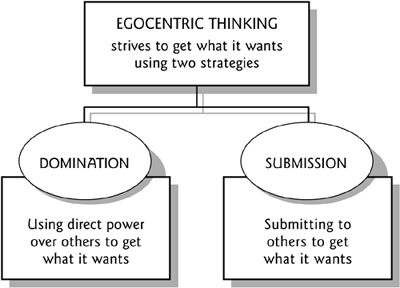Westside Toastmasters is located in Los Angeles and Santa Monica, California
Two Egocentric Functions
We have introduced you to the distinction between rationality and irrationality. Now we will discuss two distinctively different patterns of egocentric thinking. Both represent general strategies the egocentric mind uses to get what it wants and ways of irrationally acquiring power.
First let's focus on the role that power plays in everyday life. All of us need to feel that we have some power. If we are powerless, we are unable to satisfy our needs. Without power, we are at the mercy of others. Virtually all that we do requires the exercise of some kind of power, whether small or large. Hence, the acquisition of power is essential for human life. But we can pursue power through either rational or irrational means, and we can use the power we get to serve rational or irrational ends.
Two irrational ways to gain and use power are given in two distinct forms of egocentric strategy:
- The art of dominating others (a direct means to getting what one wants);
- The art of submitting to others (as an indirect means to getting what one wants).
Insofar as we are thinking egocentrically, we seek to satisfy our egocentric desires either directly, by exercising overt power and control over others, or indirectly, by submitting to those who can act to serve our interest. To put it crudely, the ego either bullies or grovels. It either threatens those weaker or subordinates itself to those more powerful, or both.
Both of these methods for pursuing our interests are irrational, both fundamentally flawed, because both are grounded in unjustified thinking. Both result from the assumption that an egocentric persons' needs and rights are more important than those they exploit for their advantage. We will briefly explore these two patterns of irrational thinking, laying out the basic logic of each.
Before we discuss these patterns, one caveat is in order. As we have mentioned, many situations in life involve using power. However, using power need not imply an inappropriate use. For example, in a business setting, hierarchical protocol requires managers to make decisions with which their employees may not agree. The responsibility inherent in the manager's position calls for that manager to use his or her power to make decisions. Indeed, managers who are unable to use the authority vested in their positions are usually ineffective. They are responsible for ensuring that certain tasks are completed. Therefore, they must use their power to see those tasks to completion. Of course that does not justify their using power unjustifiably to serve selfish ends.
The use of power, then, is and must be part of human life. The fundamental point is that power can be used either rationally or irrationally, depending on the motivation and manner of the person wielding it. Thus, if power is used to serve rational ends, and pursues those ends in a reasonable manner, it is justified. In contrast, if power is used to control and manipulate others for irrational, self-serving ends, that is another matter entirely.
Let us now turn to the two predominant patterns of irrational thinking that all of us use to the extent that we are egocentric. The first we refer to as the dominating ego function: "I can get what I want by fighting my way to the top." The second we term the submissive ego function: "I can get what I want by pleasing others." The egocentric mind chooses one over the other either through habit or through an assessment of the situation (Figure 10.7). For example, it can either forcefully displace those at the top or please those on top and gain its desires thereby. Of course, we must remember that these choices and the thinking that accompanies them function subconsciously.
Figure 10.7. Whenever we think egocentrically to serve our interests, we attempt to either dominate or submit to others.




